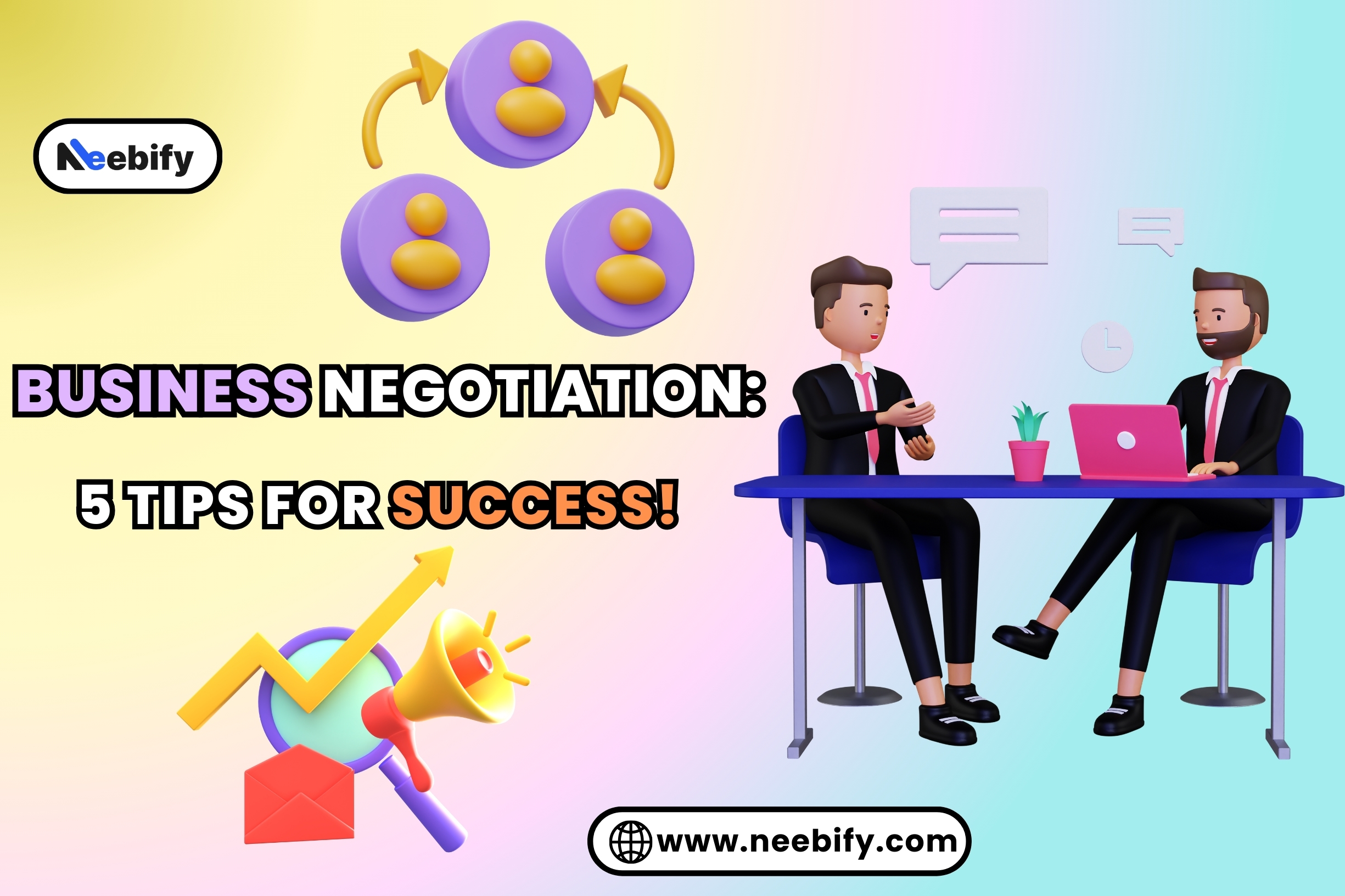Table of content
Business Negotiation: 5 Tips to Success
Mastering negotiation skills is an important task of businessmen, managers, and professionals for successful deals. In cases of negotiating terms with customers, suppliers, or other partners, it really determines if your business will end well and if you are good to do business with or not. In this article, we will be focusing on discussing a few business negotiation tips and strategies and best practices plus how some effective negotiation techniques have been able to help secure more deals.
What is Business Negotiation?
Business negotiation is a process of discussion involving terms, conditions, and agreements meant between two or more parties in the business world. These discussions commonly pursue a mutually beneficial arrangement satisfying all parties' needs and goals. It could take the form of negotiating a deal with a contractor, resolving disputes between employees or between business partners. Effective business negotiation is critical for any kind of business to ensure growth, profitability, and long-term relationships in the business environment.
Basic Definition of Business Negotiation
In simple terms, business negotiation is just a process of communication where two or more parties with different interests meet to agree upon something or settle a dispute. Whether price discussion, delivery schedule, service terms, or business strategies, it depends on the situation. A successful business negotiation could either be a strengthening or weakening of professional relationships; hence, it requires being approached skillfully and confidently.
What Are 3 Possible Strategies for Negotiation?
In terms of business negotiation strategies, there are various approaches that one can adopt depending upon the scenario. However, three highly recognized strategies are as follows:
1. Cooperative Negotiation: This is also called win-win negotiation. The emphasis here is on creating value and finding mutually beneficial solutions for all parties involved. The aim is to work together to maximize benefits for everyone. This approach is highly effective when both parties have a long-term relationship and shared interests. Cooperative negotiation emphasizes negotiation skills for busines that foster trust and cooperation.
2. Competitive Negotiation: Competitive negotiation is the complete opposite of collaborative negotiation and focuses on maximizing one's gain at the expense of the other party. This works well in one-off situations or when there is clearly a winner and loser. It requires a good understanding of successful negotiation strategies and tactics to win favorable terms.
3. Compromising Negotiation: The compromising strategy is to seek a middle ground in which both parties concede some of their demands for the sake of an agreement. It is often used when both parties have equal power, and neither can dominate the conversation. Although it might not be the best option for either party, compromising can often be a fast and effective way to resolve differences. Effective negotiation techniques include active listening and empathy that help reach a fair compromise.
What Are the 5 Steps for Business Negotiation?
Mastering business negotiation strategies is essentially understanding and following a step-by-step approach. Here are five key steps in the negotiation process:
1. Preparation: No negotiation is complete without proper preparation. What this means is that one gathers as much information as possible about the other party, his issues, and his goals. Effective business negotiation preparation allows entering the negotiation with confidence. Be sure to define clear objectives, recognize what would be your bottom line, and prepare for objections and roadblocks ahead.
A good negotiator prepares for the worst case and keeps room to pivot your strategy as needed.
2. Rapport: One of the most significant ways to create trust in negotiations is building a rapport between the two parties. Whether this will be an old client or a new one, spend some time being nice and trying to get where the other party is coming from. Good rapport helps lower tensions and sets the stage for productive discussions. It's also one of the key tips for negotiation in business,as a positive relationship often leads to better outcomes.
3. Terms Presentation: Once the rapport is established, it's time to present your terms. You should let the other person clearly and boldly know what you are interested in, supported by facts and data. Negotiation tactics for success at this step include presenting your demands as mutually beneficial. Show your value to the other party and justify how the agreement satisfies the goals of both parties.
4. Bargaining: Bargaining is the heart of negotiation where the main game is played. It involves an offer by both parties, which might result in counter offers from each side to come to an agreement. Here, patience and flexibility become very essential, along with leverage negotiation tactics for success such as asking open-ended questions to understand the needs and constraints of the other party.
5. Closure: This includes finalizing the deal. Once the parties involved agree on the terms of the deal, ensure that the details are clearly outlined without any room for misinterpretation. Here, you must tie up everything in writing as either a formal contract or an informal memorandum of understanding. To know how to close a business deal means agreeing on all the terms and even determining how long it will take to implement everything agreed upon.
What is the Advantage of Business Negotiation?
The advantage of negotiation in business extends far beyond simply getting the best possible deal. When done effectively, negotiations can lead to long-term benefits such as:
1. Stronger Relationships: Successful negotiations build trust and respect, which can lead to long-term relationships with clients, partners, and suppliers. When you know how to negotiate in business, you demonstrate professionalism and the ability to create win-win situations.
2. Improved Results: Strategic negotiation helps you get better prices, terms, and conditions, thereby leading to improved profitability. Knowing business negotiation best practices will help you get a deal that is good for both parties without unnecessary concession.
3. Conflict Resolution: Effective negotiation skills help in resolving conflicts before they turn into full-blown situations. Whether it is a disagreement with a partner or a dispute with a client, knowing how to approach these situations with diplomacy and respect can avoid costly confrontations. Improving negotiation skills helps professionals manage conflicts in a productive and efficient way.
4. Added Value: Effective negotiators are well equipped for the added value to their business. It could be about negotiating better payment terms, better quality goods, or better services. Each negotiation that ends in success thus brings about avenues for growth and improvement. Through the effective negotiation tactics, companies can be constantly growing in value.
5. Competitive Advantage: Mastering business negotiation gives companies an edge over their competitors. Skilled negotiators can secure better deals and make decisions that lead to growth and expansion, positioning the business for success in competitive markets.
How to Improve Your Negotiation Skills?
Whether you’re a beginner or an experienced negotiator, there’s always room to improve your skills. Here are some negotiation tips for boosting your abilities:
1. Actively Listen: To apply effective negotiation techniques, one needs to understand the other party's needs and concerns. Active listening is a basis to build rapport, discover hidden interests, and arrive at appropriate solutions that work for parties involved.
2. Emotional Intelligence: While negotiating is a delicate process, developing emotional intelligence is unavoidable. The capability to understand and control both your emotions and those of others greatly influences the outcome of the negotiation. With effective negotiation skills for business, this has to include empathy and emotional control.
3. Maintain Calm in Pressure Situations: Negotiation is always stressful, but keeping calm and composed will help you think clearly and make better decisions. Keep a cool head, even when things get challenging.
4. Using Data and Facts: In many negotiations, evidence and data turn out to be excellent persuaders towards the other party's negotiable position. Use business negotiation strategies that rely on solid evidence to back up your claims and strengthen your case.
5. Know When to Walk Away: Not every negotiation will lead to a favorable outcome. If the terms don’t align with your objectives, be prepared to walk away. Knowing when to end the negotiation is a sign of strength and confidence.
Conclusion
Business negotiation is a complex yet rewarding skill that requires practice, strategy, and preparation. By understanding business negotiation tips, successful negotiation strategies, and effective negotiation techniques, you can actually become a more skilled negotiator and achieve better results in your professional relationships. Always approach negotiations with an attitude of collaboration and mutual respect, aiming for win-win results that benefit both parties. Whether you are an entrepreneur, a manager, or an already established business professional, negotiation for entrepreneurs and mastering business negotiation best practices will be positioning you right for long-term success and growth in your career.
Get your next meeting in a
matter of minutes.
Free Trial
Latest
The Ultimate LinkedIn Outreach Playbook 2025
A practical, modern guide to mastering LinkedIn outreach in 2025 — learn how to boost reply rates, p
12/1/2025How to Find 100 ICP Leads Without LinkedIn Sales Navigator
Generating 100 targeted ICP leads doesn’t require LinkedIn Sales Navigator. Learn how to leverage fr
11/28/2025


